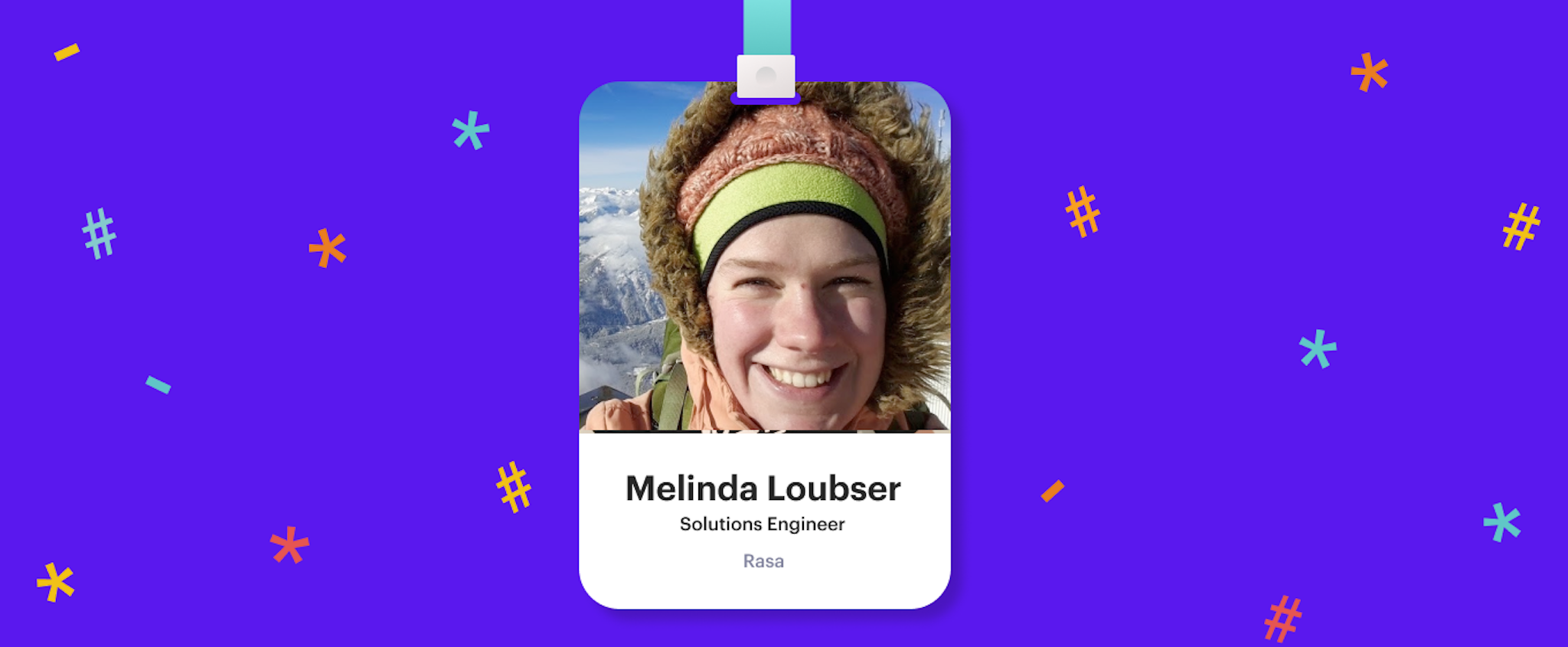February 12th, 2021
The Humans Behind the Bots: Melinda Loubser
Rasa
At Rasa, our team is building the standard infrastructure for conversational AI. Behind the scenes, the people of Rasa come together from diverse backgrounds to solve today's most interesting challenges in NLP and dialogue management. We're pulling back the curtain to highlight a few of the humans behind the bots.
Today we're talking with Melinda, Solutions Engineer at Rasa. We'll learn Melinda's story and explore the day-to-day projects and technologies they're passionate about.
Hi, Melinda. Tell us about yourself! What was your path to joining Rasa?
During my linguistics undergraduate studies, I became interested in using computers to solve language-related problems. I especially loved morphology; it was like math with words. I figured computers are good at math, they should be able to help with that - turns out they can! That was how I found out about NLP as a field.
I had an amazing supervisor during my postgraduate studies at CTexT who pretty much set me free on the available research computer (sorry for breaking it so often). That experience helped me learn a ton, both about NLP and technology in general, in a very hands-on way.
My first job out of university was at an insurance company which was using Rasa, and some awesome Rasa solutions engineers were working with the team I was on. They just seemed to love what they were doing, so when I saw Rasa was hiring, it was a no-brainer to apply.
A general about-me: I'm from South Africa, I live in Berlin and I like climbing trees and mechanical tinkering.
Take us through a typical day as a Solutions Engineer. What types of projects do you work on?
I spend a good part of my time supporting customers by helping debug deployment issues, looking at best-practices for their current stage of bot development, or conducting training sessions. Otherwise I work on issues on our Github repos. The CSE (Customer Success Engineering) team owns the documentation, so I'm often found writing docs or reviewing docs for new features. We're also responsible for our starter packs, and I enjoy the time I spend working on our demo bots, aligning them with best practices and adding fun new features.
Which areas of your work are you most passionate about?
I love hunting bugs. Yes, it makes me call my laptop bad names, but I find it tremendously satisfying to find the root cause of a problem in code and fix it. I'm also passionate about good user education. I've benefited from amazing teachers in the past, and I want to pass that on by finding ways of explaining concepts that stick with people and help them succeed.
What's an important problem you're solving at Rasa?
Currently my team is working on how we can best set users up for success by providing practical training. Hands-on training is valuable for really cementing concepts, and in a remote-first world we need to get creative in creating an environment for that.
How would you describe Rasa in three words?
As a company made up of people: Intentional, Intelligent, Energetic.
Everything at Rasa feels on-purpose, and "it's always been done this way" is never a good reason to keep doing something sub-optimal.
I'm constantly amazed and grateful at how dang smart my colleagues are, and I pick their brains on the regular.
All that on-purpose intelligence makes for an energetic environment; something is always happening, on the move, being improved, and quite quickly too.
How do you collaborate with other teams at Rasa?
The CSE (Customer Success Engineering) team sits kind of in the middle of a lot of teams because of our proximity to customers' projects. A lot of customer-support happens behind the scenes by collaborating with other engineers to figure out challenging problems. We also collaborate with the product team by sharing feedback from customers, with developer relations on supporting our community users, and with sales for prospective customers' technical questions.
Another "how" of collaboration is communication. I'm working with colleagues all over the world, in different time zones, and with different schedules. If we relied only on meetings to collaborate, we'd never get anything done. That's why we communicate mostly asynchronously, using Slack and Github. I find the transparency that comes with that very helpful for collaboration too, since I can search for past discussions on a topic and get background before starting a new discussion.
What does a culture of diversity mean for you at Rasa?
One of my first impressions of Rasa as a company was that change is welcome here. Willingness to change is required to nurture a culture of diversity. It starts with being feedback-oriented and not being afraid of change in the little things, like the ways we communicate on Slack, or how a meeting is run, and goes all the way up to hiring initiatives and strategic planning.
How has working at Rasa helped your professional development?
Rasa is big on supporting employees' personal development, which has let me invest time in improving my skills, most recently by studying for the Certified Kubernetes Application Developer exam. Besides that, working at Rasa has helped me see what I value in a work environment, honesty and cooperation being two that come to mind. That helps me work on becoming the kind of colleague I want to work with.
What's the most interesting thing you've learned lately?
There are open water swimmers who have swam across all 34 km of False Bay (White shark capital of the world, anybody?) and still think this is a good idea.
What's the best career advice you've received?
All jobs require skills. All skills can be learned. The really necessary skill is learning.
Thanks Melinda! You can find her on LinkedIn.
Want to team up with Rasa? We're hiring! Find open positions for Solutions Engineering and other roles on our Jobs Board.
